人教版新目标八年级上册英语语法知识及练习
人教版八年级上册英语语法默写

人教版八年级上册英语语法默写本文档旨在为八年级学生提供一份关于人教版八年级上册英语语法的默写材料。
以下是需要掌握的语法知识和一些相关练题。
一、词汇语法1. 名词- 名词的复数形式- 不可数名词2. 代词- 主格、宾格、形容词性物主代词3. 冠词- 不定冠词与定冠词的用法4. 形容词与副词- 形容词与副词的比较级与最高级5. 动词- 动词的时态- 动词的非谓语形式(动词原形、动词-ing形式、动词过去分词)6. 介词- 常见的介词及其用法二、句子语法1. 句子成分- 主语与谓语- 宾语与宾补- 表语与宾语补足语- 定语与状语2. 句子分类- 简单句- 并列句- 复合句- 疑问句三、时态与语态- 一般现在时- 一般过去时- 一般将来时- 现在进行时- 过去进行时- 过去将来时- 被动语态四、其他语法知识- 数词的表达- 感叹句的构成- 比较级与最高级的表达示例题:1. 把下列名词的复数形式填写在括号里:- book ( )- apple ( )2. 填入恰当的代词填空:- This is ( ) book.- Tom is my friend. I invited ( ) to my party.3. 选择正确的冠词填空:- Can I have ( ) apple?4. 选择恰当的形容词或副词形式填空:- She dances ( ) than her sister.- This is ( ) book in the library.5. 用动词的正确形式填空:- I usually ( ) my grandmother on Sundays. (visit)- They enjoy ( ) basketball. (play)以上只是一小部分练题,希望能够帮助大家巩固人教版八年级上册英语语法知识。
详细的练题和答案请参考教材或其他相关辅导资料。
注意:请大家务必独立完成默写,不要参考他人答案,以提高自己的语法水平。
新人教版八年级上册英语全册短语句型辨析语法讲解与练习

八年级上册英语Unit 1 Where did you go on vacation? 短语:go on vacation stay at homego to the mountains go to the beach visit museums go to summer camp quite a few study forgo out most of the time taste good have a good timeof course feel like go shopping in the pastwalk around come uptoo many because ofone bowl of find outgo on take photos something important up and down语法:Where did you go on vacation? I went to New York City.Did you go out with anyone? No, No one was here. Everyone was on vacation. Did you buy anything special? Yes, I bought something for my father.How was the food? Everything tasted really good.Did everyone have a good time? Oh,yes. Everything was excellent.惯用法:1. buy sth for ab./ buy sb. sth 为某人买某物2. taste + adj. 尝起来……3. nothing ….but + V.(原形) 除了……之外什么都没有4. seem + (to be) + adj 看起来5. arrive in + 大地方/ arrive at + 小地方到达某地6. decide to do sth. 决定做某事7. try doing sth. 尝试做某事/ try to do sth. 尽力做某事8. enjoy doing sth. 喜欢做某事9. want to do sth. 想去做某事10. start doing sth. 开始做某事11. stop doing sth. 停止做某事12. look + adj 看起来13. dislike doing sth. 不喜欢做某事14. Why not do sth. 为什么不做…….呢?15. so + adj + that + 从句如此……以至于……16. tell sb. (not) to do sth. 告诉某人(不要)做某事17. keep doing sth. 继续做某事18. forget to do sth. 忘记去做某事/ forget doing sth 忘记做过某事词语辨析:1.anywhere 与somewhere 两者都是不定副词。
人教版八年级英语上册Unit1词汇语法句型及练习题 语法小结

语法小结1、第一单元主要学习的时态是过去时。
(1)一般过去时态,表示过去某个时间发生的动作或存在的状态,常与表示过去的时间状语连用,如“yesterday”、“last month”、“ten minutes ago, in ”等Eg: I went to the 200 last week.(2)一般过去时还可表示过去的习惯性动作,常用“used to”表达,意为“过去常常”。
Eg: I used to go to school on foot.(3)通过上下文判断动作发生在过去的,也用过去时。
A: Where did you go?B: I went to my uncle’s.2、一般过去时的肯定句、否定句和疑问句的构成。
(1)肯定句:主语+动词过去式。
Eg: She was a student ten years ago.(2)否定句:主语+was/were+not或主语+didn’t+动词原形。
Eg: They weren’t here just now.Tim didn’t play soccer yesterday afternoon.(3)一般疑问句:was/were+主语+…或Did+主语+动词原形+……?Eg: Were you at home yesterday?Did she go shopping last weekend?(4)特殊疑问句:特殊疑问句+一般疑问句?Eg: When did you go to the park?What did they do last night?3、动词过去式的构成。
(1)规则变化。
①一般情况在动词的词尾加ed.play—played work—worked②以不发音字母e结尾的在词尾加d.like—liked practice—practiced③末尾只有一个辅音字母的重读闭音节词,双写这个辅音字母再加ed.stop—stopped plan—planned④以辅音字母加y结尾的动词变y为i再加ed.study—studied worry—worried(2)不规则变化见教材后面的动词表。
人教版新目标英语八年级上学期期中考试分类复习训练题(Units 1-5语法基础知识篇)

人教版新目标英语八年级上学期期中考试分类复习训练题(Units 1-5)语法基础知识篇Unit 1:一、单项选择:( )1.My mother has umbrella. It`s useful tool for her to use it in both rainy and sunny weather.A.a , a B,an , an C. an ,a D.a, an( )2.Peter`s grandfather never speaks Chinese, but he knows Chinese characters.A.a littleB.quite a fewC.littleD.quite a lot( )3.—What would you like to buy for your mother on her birthday this year?-- special.I still make a nice card for her as before..A.SomethingB.AnythingC.EverythingD.Nothing( )4.—Look! The lights in the classroom are still on. Who is in it ?--- .Maybe forgot to turn them off.A.Nobody, somebodyB.None, someoneC.Someone. no oneD.No one, anybody( )5.—How many relatives did you visit during the Spring Festival of 2020?--- . All of us had to stay at our own homes because of the COVID-19.A.NobodyB.NoneC.No oneD.Nothing( )6.---Can you follow me, Tom ?—Yes, madam. You speak .A.enough clearB.clear enoughC.enough clearlyD.clearly enough( )7.--- fine weather it is today!---Yes. My sister and I can enjoy in the sun.A.What a, ourselvesB.What, ourselvesC.How , yourselvesD.What, yourselves( )8.-----Is here ?---Sorry, Miss Smith. Bob isn`t here.A.everyoneB.anyoneC.someoneD.no one( )9.Jack tried the door but the key didn`t work, so he tried into the room through the window and made it at last.A.opening,goingB.to open, goingC.opening, to goD.to open, to go( )10.---Come on! Jenny. Someone the school gate.A.is waiting forB.are waiting atC.is waiting atD.are waiting for二、句型转换:一空一词1.Mr. Black seemed to make a decision to visit the Palace Museum .(改为同义句)It that Mr. Black to visit the Palace Museum.2.Because the journey was very long, we all wanted to have a rest on halfway.(改为同义句)All of us a rest on halfway the long journey.3.The boy is too young to finish the work by himself.(改为同义句)The boy isn`t to finish the work by himself.(4.Mark did something special last Sunday.(改为否定句)Mark special last Sunday.Mark special last Sunday5.Shared bikes are very popular in big cities.(改为感叹句)shared bikes are in big cities !三、完成句子:(一空一词)1.无论做什么事,尽自己最大的努力吧!Whatever you do, .2.周六还是周日去野炊对我没什么影响。
最新人教版八年级上册英语知识点(单词、短语、句子、语法、练习)
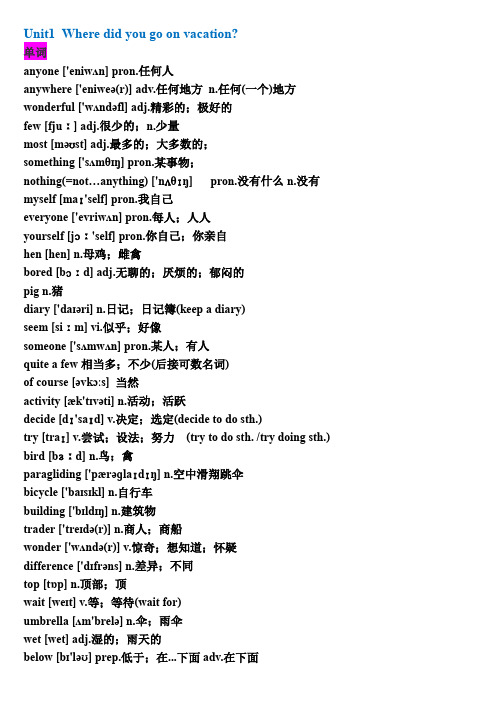
o n?单词['eniwʌ ] pron.任何人r e ['eniwe(r)] adv.任何地方n.任何(一个)地方f ul ['wʌnd l] adj.精彩的;极好的few [fjuː] adj.很少的;n.少量most [mʊst] adj.最多的;大多数的;i ng ['sʌ θɪ ] pron.某事物;n g) ['nʌθɪ ] p .没有什么n.没有[maɪ'self] pron.我自己n e ['evriwʌ n] pron.每人;人人l f [jɔː'self] pron.你自己;你亲自hen [hen] n.母鸡;雌禽bored [bɔːd] adj.无聊的;厌烦的;郁闷的pig n.猪diary ['daɪ ] n.日记;日记簿(keep a diary)seem [siːm] vi.似乎;好像e ['sʌmwʌ ] pron.某人;有人quite a few相当多;不少(后接可数名词)[vkɔ ]当然t y [æk'tɪv] n.活动;活跃[dɪ'saɪd] v.决定;选定to do sth.)try [traɪ] v.尝试;设法;努力(try to do sth. /try doing sth.) bird [bɜːd] n.鸟;禽p i ding ['pær ɡ aɪdɪ ] .空中滑翔跳伞bic e ['baɪsɪ l] n.自行车n g ['bɪldɪ ] n.建筑物['treɪd(r)] n.商人;商船['wʌnd(r)] v.惊奇;想知道;怀疑e nce ['dɪfr s] n.差异;不同top [tɒp] n.顶部;顶wait [weɪt] v.等;等待(wait for)l a [ʌm'brel] n.伞;雨伞wet [wet] adj.湿的;雨天的below [bɪ'l ʊ] prep.低于;在...下面adv.在下面as [z] conj.如同;像...一样[ɪ'nʌf] adj.足够的.足够地;充分地duck [dʌk] n.鸭肉;鸭(反full) ['hʌ ɡ ] adj.饥饿的;渴望的feel like(doing sth.)想要e [dɪs'laɪk] v.不喜欢;厌恶n.不喜爱;厌恶;反感重点短语1. go on vacatio n去度假2.stay at home 待在家里3.go to the mountai n s 去爬山4. go to the beach 去海滩5. visit museums 参观博物馆6. go to summer camp 去参 7.quite a few 相当多8.study for 为……而学习9.go out 出去10.most of the time 大部分时间11. taste good 尝 很好 12.have a good time 玩得高兴13. of course当然14.feel like 给……的感觉;感受到15.go shoppin g 去购物16.in the past 在过去17. walk around四处走走18. because of 因为19. one bowl of…一碗……20. the next day 第二天21. drink tea 喝茶22. find out 找出;查明23. go on 继续24.take photos照相25. somethi ng importa nt 重要的事26. up and down 上上下下27. come up 出28. buy sth. for sb. / buy sb. sth. 为某人 某物29. taste + adj. 尝 ……30. look+adj. 看 ……31.nothing…but+动词原形 …… 什么 没有32.seem+(to be)+ adj. 看 ……33. arrive in+大地点/ arrive at+小地点到达某地34.decide to do sth. 决定去 某事35. try doing sth. 尝试 某事/36. try to do sth. 力去 某事37. forget doing sth. 记 过某事/38. forget to do sth. 记 某事39. enjoy doing sth. 喜欢 某事40. want to do sth. 想去 某事41. start doing sth. 开始 某事42. stop doing sth. 停止 某事43. dislike doing sth.不喜欢 某事44. keep doing sth. 继续 某事45. Why not do. sth.? 为什么不 ……呢?46. so+adj.+that+从句如此……以至于……47. tell sb. (not) to do sth. 告诉某人(不要) 某事48 .f=have fun(doing sth.)玩得痛快三、重点句子:1. Where did you go on vacatio n? 你去 度假的?2. Long time no see. 好久不见。
最新人教版英语八年级上册第5单元语法知识总结和习题练习
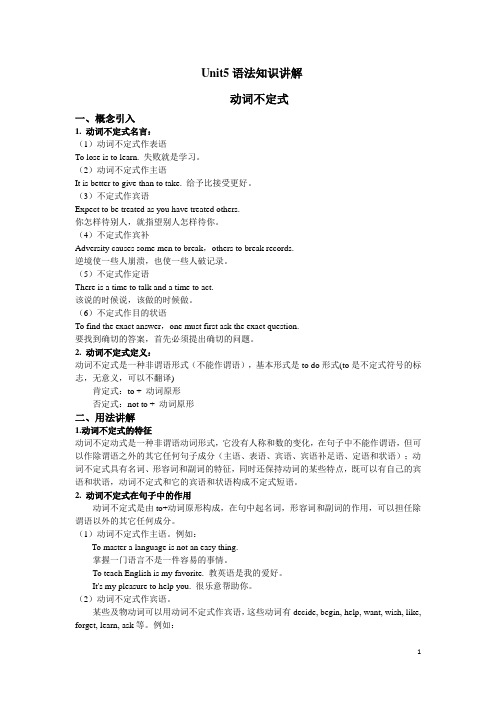
Unit5语法知识讲解动词不定式一、概念引入1. 动词不定式名言:(1)动词不定式作表语To lose is to learn. 失败就是学习。
(2)动词不定式作主语It is better to give than to take. 给予比接受更好。
(3)不定式作宾语Expect to be treated as you have treated others.你怎样待别人,就指望别人怎样待你。
(4)不定式作宾补Adversity causes some men to break,others to break records.逆境使一些人崩溃,也使一些人破记录。
(5)不定式作定语There is a time to talk and a time to act.该说的时候说,该做的时候做。
(6)不定式作目的状语To find the exact answer,one must first ask the exact question.要找到确切的答案,首先必须提出确切的问题。
2. 动词不定式定义:动词不定式是一种非谓语形式(不能作谓语),基本形式是to do形式(to是不定式符号的标志,无意义,可以不翻译)肯定式:to + 动词原形否定式:not to + 动词原形二、用法讲解1.动词不定式的特征动词不定动式是一种非谓语动词形式,它没有人称和数的变化,在句子中不能作谓语,但可以作除谓语之外的其它任何句子成分(主语、表语、宾语、宾语补足语、定语和状语);动词不定式具有名词、形容词和副词的特征,同时还保持动词的某些特点,既可以有自己的宾语和状语,动词不定式和它的宾语和状语构成不定式短语。
2. 动词不定式在句子中的作用动词不定式是由to+动词原形构成,在句中起名词,形容词和副词的作用,可以担任除谓语以外的其它任何成分。
(1)动词不定式作主语。
例如:To master a language is not an easy thing.掌握一门语言不是一件容易的事情。
人教版八年级英语上知识点
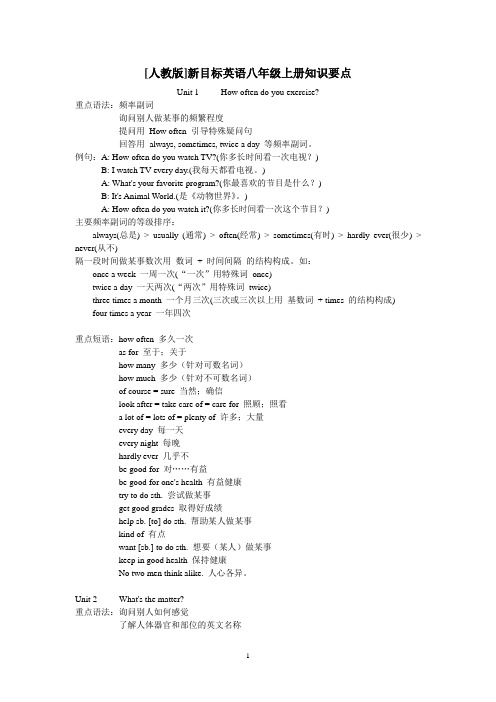
[人教版]新目标英语八年级上册知识要点Unit 1 How often do you exercise?重点语法:频率副词询问别人做某事的频繁程度提问用How often 引导特殊疑问句回答用always, sometimes, twice a day 等频率副词。
例句:A: How often do you watch TV?(你多长时间看一次电视?)B: I watch TV every day.(我每天都看电视。
)A: What's your favorite program?(你最喜欢的节目是什么?)B: It's Animal World.(是《动物世界》。
)A: How often do you watch it?(你多长时间看一次这个节目?)主要频率副词的等级排序:always(总是) > usually (通常) > often(经常) > sometimes(有时) > hardly ever(很少) > never(从不)隔一段时间做某事数次用数词+ 时间间隔的结构构成。
如:once a week 一周一次(“一次”用特殊词once)twice a day 一天两次(“两次”用特殊词twice)three times a month 一个月三次(三次或三次以上用基数词+ times 的结构构成)four times a year 一年四次重点短语:how often 多久一次as for 至于;关于how many 多少(针对可数名词)how much 多少(针对不可数名词)of course = sure 当然;确信look after = take care of = care for 照顾;照看a lot of = lots of = plenty of 许多;大量every day 每一天every night 每晚hardly ever 几乎不be good for 对……有益be good for one's health 有益健康try to do sth. 尝试做某事get good grades 取得好成绩help sb. [to] do sth. 帮助某人做某事kind of 有点want [sb.] to do sth. 想要(某人)做某事keep in good health 保持健康No two men think alike. 人心各异。
人教版新目标八年级英语上册各单元知识详解
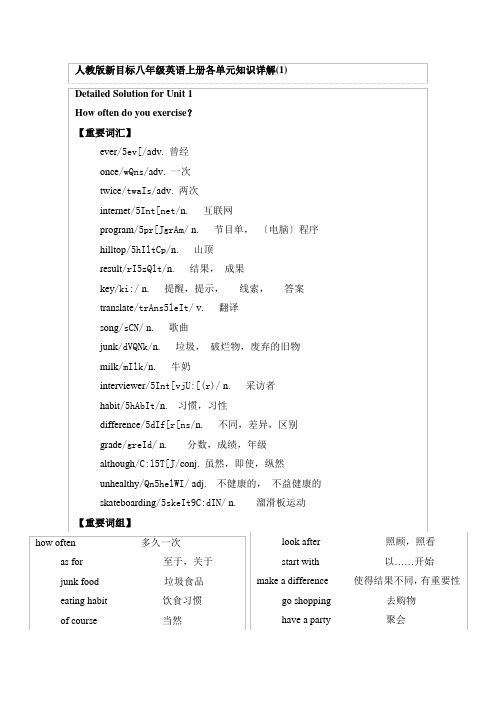
Detailed Solution for Unit 2 What’s the matter.【重要词汇】◆ matter/5mAt[/n.事情,问题,过失◆ arm/B:m/n.臂,胳膊◆ back/bAk/n.后背,背脊◆ ear/I[/n.耳朵◆ eye/aI/n.眼睛◆ foot/fJt/n.脚,足〔pl. feet/fi:t/〕◆ leg/leg/n.腿,腿部◆ neck/nek/n.脖子,颈部◆ nose/n[Jz/n.鼻子◆ stomach/5stQm[k/n.胃,胃部◆ tooth/tU:W/n.牙齿(pl. teeth/ti:W/)◆ sore/sC:,sC[/adj.疼痛的◆ stomachache/5stQm[keIk/n.胃痛,腹痛,肚子痛◆ throat/Wr[Jt/n.喉头,喉咙◆ toothache/5tU:WeIk/n.牙痛◆ fever/5fi:v[/n.发烧◆ lie/laI/v.躺,卧,平放在某处(lay, lain)◆ honey/5hQnI/n.蜂蜜◆ dentist/5dentIst/n.牙医◆ illness/5IlnIs/n.疾病,生病◆ advice/[d5vaIs/n.劝告,忠告,建议◆ thirsty/5W\:stI/adj.渴的,口渴的◆ heal/hi:l/v. 医治,治愈◆ balance/5bAl[ns/n. 平衡,平衡状态,协调◆ beef/bi:f/n. 牛肉◆ lamb/lAm/n. 小羊,羊羔,羊羔肉◆ energy/5en[dVI/n.精力,活力,能力◆ life/laIf/n. 生命,人生◆ bean/bi:n/n.豆,豆科植物◆ stray/streI/v. 远离,走失,离题◆ balanced/5bAl[nst/adj.平衡的,协调的◆ diet/5daI[t/n. 饮食,节食◆ backache/5bAkeIk/n.背痛◆ improve/Im5prU:v/v. 改善,改进,提高◆ speaking/5spi:kIN/ n. 口语◆ headache/5hedeIk/ n. 头痛◆ homestay/5h[JmsteI/ n. 待在家里◆ important//Im5pC:t[nt/adj. 重要的,重大的,严重的【重要词组】◆ have a cold患感冒◆ stressed out 紧张的,有压力的◆ bean sprout豆芽◆ get tired感觉疲惫◆ stay healthy保持健康◆ at the moment此刻,现在◆ get/ have a cold患感冒◆ see a doctor /dentist看医生/牙医◆ go to the party去参加聚会◆ make sb sick使某人不舒服(患锁病)◆ have a sore throat嗓子痛◆ have a fever发烧,发热◆ have a toothache牙痛◆ have a backache背痛◆ lie down and rest 躺下休息◆ drink lots of water 喝大量水◆ drink hot tea with honey 喝热蜂蜜茶◆ have a headache头痛◆ get tired 累了【重要词汇扩展】身体部位:head头neck颈部shoulder肩back后背leg腿thigh大腿arm手臂hand手nose 鼻子eye眼睛ear耳朵mouth嘴tooth牙齿foot脚〔注意foot的复数形式为feet,tooth的复数形式为teeth〕stomach胃throat喉咙,咽喉chest胸部pit胸口abdomen lung肺heart心脏liver 肝脏腹部waist腰backbone脊骨,脊柱hip臂部joint关节muscle肌肉nerve神经brain 脑疾病:cancer癌 influenza , flu流感 cough咳嗽sore eyes眼睛疼stuffy nose鼻子不通气 insomnia失眠医院工作人员:doctor in charge主治医生 head nurse护士长internist , physician内科医生surgeon外科医生dentist牙科医生 ear-nose-throat doctor 耳鼻喉医生医院名称:children’s hospital儿童医院 clinic 诊疗所first - aid station 急救站 ward 病房medical department 内科 surgical department 外科registration office 挂号处 out - patient department(OPD) 门诊部in - patient department 住院部 nursing department 护理部waiting room 候诊室 emergency room 急诊室operation room 手术室 laboratory 化验室blood bank 血库 pharmacy , dispensary 药房表示感觉的形容词有:tired 累的 thirsty口渴的 hungry饿的 stressed out紧张的,有压力的【重要词句详解】1. How to talk about our health①问某人哪儿不舒服:When we are not feeling well , we often go to see the doctor . The doctor will ask : What’s wrong (with you) ?What’s the matter (with you) ?What’s your trouble ?What happens to you ?Is there anything wrong with you ?都表示“你怎么了?”。
人教版八年级英语上册知识点汇总与练习
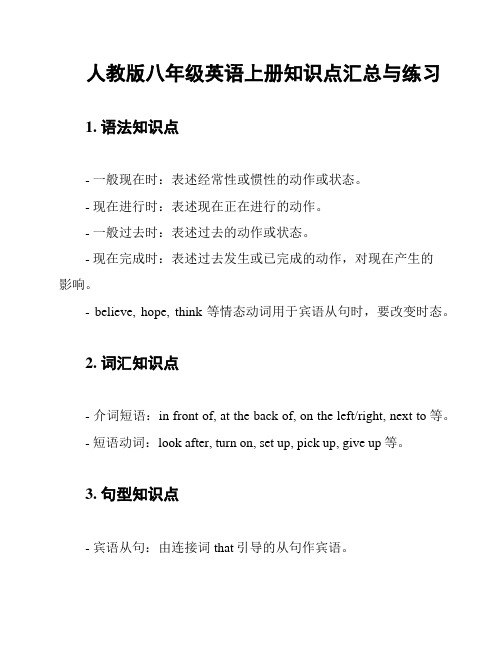
人教版八年级英语上册知识点汇总与练习1. 语法知识点- 一般现在时:表述经常性或惯性的动作或状态。
- 现在进行时:表述现在正在进行的动作。
- 一般过去时:表述过去的动作或状态。
- 现在完成时:表述过去发生或已完成的动作,对现在产生的影响。
- believe, hope, think等情态动词用于宾语从句时,要改变时态。
2. 词汇知识点- 介词短语:in front of, at the back of, on the left/right, next to等。
- 短语动词:look after, turn on, set up, pick up, give up等。
3. 句型知识点- 宾语从句:由连接词that引导的从句作宾语。
- 时间状语从句:由连接词when, before, after, while等引导的从句,用来表示时间关系。
- 目的状语从句:由连接词so that引导的从句,用来表示目的。
- 虚拟条件句:由连接词if引导的条件句,表示假设情况。
4. 阅读与写作练阅读材料:The Importance of ReadingHere are some tips to develop good reading habits:1. Set aside dedicated time for reading every day.2. Choose a variety of books based on your interests.3. Start with books that are at your reading level, and gradually challenge yourself.4. Take notes while reading to help with understanding and retention.5. Discuss the books you read with others to gain different perspectives.写作练:Write about your favorite book and explain why you like it.My favorite book is "Harry Potter and the Philosopher's Stone" by J.K. Rowling. I like this book because it takes me on a magical journey filled with adventure and excitement. The characters are well-developed and the story is captivating. I enjoy the creativity and imagination that Rowling brings to the world of Hogwarts. The book teaches important lessons about friendship, bravery, and the power of love. Overall, "Harry Potter and the Philosopher's Stone" is a book that brings joy and wonder to my life.5. 总结本文档汇总了人教版八年级英语上册的一些重要知识点,包括语法、词汇和句型。
英语八年级上册Units 1-2语法归纳同步练习-人教版(新目标)

初二英语上册Units 1-2语法归纳同步练习(答题时间:40分钟)微课程:不定代词(上册Units 1-2语法归纳)同步练习I. 选词填空1. You must do carefully. (something, everything)2. Granny Liu has rice now. Let’s buy _______________ forher. (little, a little, some)3. I am off duty today. Give me to read. (everything,something)4. They all came to the playground for morning exercises. of them were late. (neither, none)5. My sister gave me two pictures. One is the Great Wall, is the Ming Tombs. (another, other, the other)6. He asked for money and I gave him . (some, any)7. Did you eat at supper time? (much, many)8. If calls, tell him I am busy. (anyone,someone)9. Is ___________________ here today? (everyone; someone)II. 根据汉语意思完成下列句子1. 太阳总是从东方升起。
The sun ______________________ rises in the east.2. 我弟弟从不努力学习。
My brother ___________________ studies hard.3. 吉姆通常十二点睡觉。
新人教版八年级上册英语单元语法及知识点概述
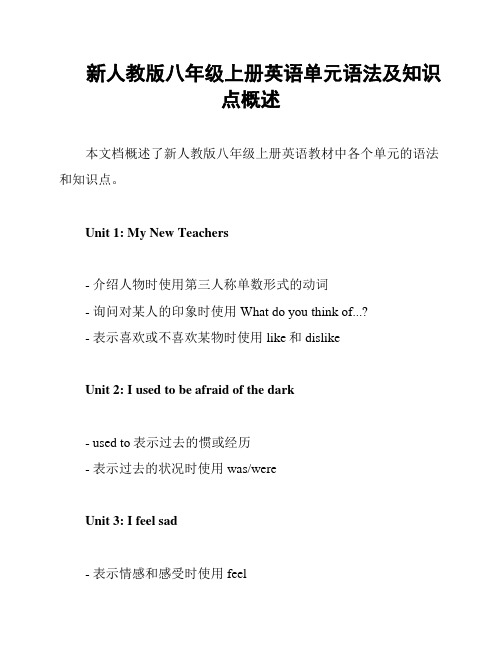
新人教版八年级上册英语单元语法及知识点概述本文档概述了新人教版八年级上册英语教材中各个单元的语法和知识点。
Unit 1: My New Teachers- 介绍人物时使用第三人称单数形式的动词- 询问对某人的印象时使用What do you think of...?- 表示喜欢或不喜欢某物时使用like和dislikeUnit 2: I used to be afraid of the dark- used to表示过去的惯或经历- 表示过去的状况时使用was/wereUnit 3: I feel sad- 表示情感和感受时使用feel- 使用be动词+形容词表达情感状态- 表示总是或经常做某事时使用always或often Unit 4: What's the best movie theater?- 比较级和最高级的用法- 询问建议时使用What do you suggest?- 表示原因时使用becauseUnit 5: It must belong to Carla- 表示推测或某事是肯定的时使用must- 表示推测或某事是可能的时使用might- 表示推测或某事是否定的时使用can'tUnit 6: I like music that I can dance to- 表示喜欢某种中性事物时使用like- 表示喜欢可以+动词原形的事物- 表示不喜欢不可以+动词原形的事物Unit 7: Teenagers should be allowed to choose their own clothes- 表示应该或不应该做某事时使用should or shouldn't- 表示能够或不允许做某事时使用can or can't- 使用be动词+动词不定式表示被允许或不被允许做某事Unit 8: Home alone- 表示需要或必需做某事时使用have to- 表示过去需要或必需做某事时使用had to- 表示建议或推荐时使用should或had betterUnit 9: When was it invented?- 使用一般过去时表示过去的经历或事件- 使用一般过去时的疑问句形式提问过去的经历或事件- 使用介词短语表示一段时间以上是新人教版八年级上册英语教材中各单元的语法和知识点概述。
人教版新目标八年级英语上册第一单元语法情态动词的用法及练习
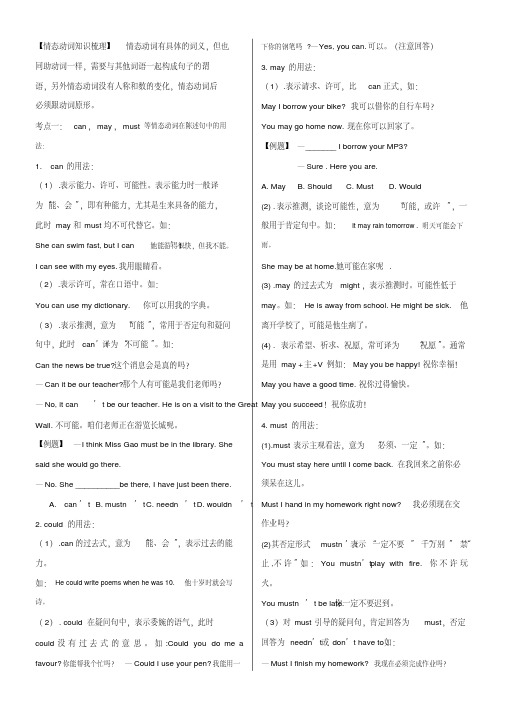
【情态动词知识梳理】情态动词有具体的词义,但也同助动词一样,需要与其他词语一起构成句子的谓语,另外情态动词没有人称和数的变化,情态动词后必须跟动词原形。
考点一:can,may,must等情态动词在陈述句中的用法:1.can的用法:(1).表示能力、许可、可能性。
表示能力时一般译为“能、会”,即有种能力,尤其是生来具备的能力,此时may和must均不可代替它。
如:She can swim fast, but I can’t .她能游得很快,但我不能。
I can see with my eyes.我用眼睛看。
(2).表示许可,常在口语中。
如:You can use my dictionary. 你可以用我的字典。
(3).表示推测,意为“可能”,常用于否定句和疑问句中,此时can’t译为“不可能”。
如:Can the news be true?这个消息会是真的吗?—Can it be our teacher?那个人有可能是我们老师吗?—No, it can’t be our teacher. He is on a visit to the Great Wall.不可能。
咱们老师正在游览长城呢。
【例题】—I think Miss Gao must be in the library. Shesaid she would go there.—No. She __________be there, I have just been there.A.can’tB. mustn’tC. needn’tD. wouldn’t2. could的用法:(1).can的过去式,意为“能、会”,表示过去的能力。
如:He could write poems when he was 10. 他十岁时就会写诗。
(2). could在疑问句中,表示委婉的语气,此时could没有过去式的意思。
如:Could you do me a favour?你能帮我个忙吗?—Could I use your pen?我能用一下你的钢笔吗?—Yes, you can.可以。
新目标人教版初中八年级上册英语语法汇总

新目标人教版初中八年级上册英语语法汇总1) leave的用法1.“leave+地点”表示“离开某地”。
例如When did you leave Shanghai?你什么时候离开上海的2.“leave for+地点”表示“动身去某地”。
例如Next Friday, Alice is leaving for London. 下周五爱丽斯要去伦敦了。
3.“leave+地点+for+地点”表示“离开某地去某地”。
例如Why are you leaving Shanghai for Beijing?你为什么要离开上海去北京2) 情态动词should“应该”学会使用should作为情态动词用常常表示意外、惊奇、不能理解等有“竟会”的意思例如How should I know? 我怎么知道Why should you be so late today?你今天为什么来得这么晚should有时表示应当做或发生的事例如We should help each other.我们应当互相帮助。
我们在使用时要注意以下几点1. 用于表示“应该”或“不应该”的概念。
此时常指长辈教导或责备晚辈。
例如You should be here with clean hands. 你应该把手洗干净了再来。
2. 用于提出意见劝导别人。
例如You should go to the doctor if you feel ill. 如果你感觉不舒服你最好去看医生。
3. 用于表示可能性。
should的这一用法是考试中常常出现的考点之一。
例如We should arrive by supper time. 我们在晚饭前就能到了。
She should be here any moment. 她随时都可能来。
3) What...? 与Which...?1. what 与which 都是疑问代词都可以指人或事物但是what仅用来询问职业。
如Whatis your father? 你父亲是干什么的该句相当于What does your father do?What is your father's job?Which 指代的是特定范围内的某一个人。
人教版英语八年级上册知识讲解及练习含答案
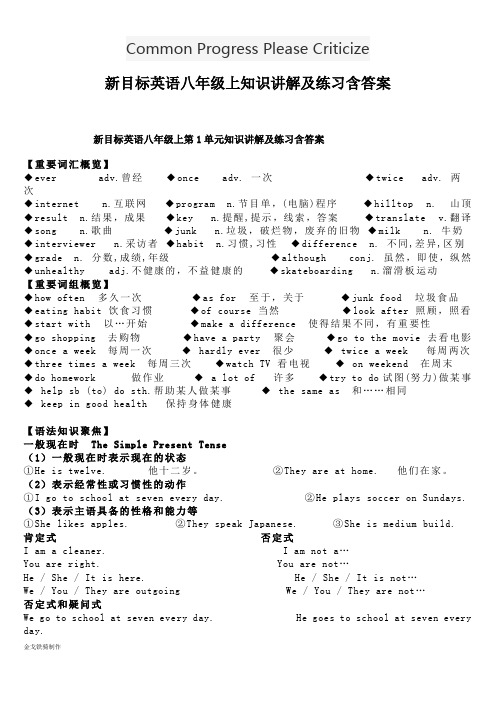
新目标英语八年级上知识讲解及练习含答案新目标英语八年级上第1单元知识讲解及练习含答案【重要词汇概览】◆ever adv.曾经◆once adv. 一次◆twice adv. 两次◆internet n.互联网◆program n.节目单,(电脑)程序◆hilltop n. 山顶◆result n.结果,成果◆key n.提醒,提示,线索,答案◆translate v.翻译◆song n.歌曲◆junk n.垃圾,破烂物,废弃的旧物◆milk n. 牛奶◆interviewer n.采访者◆habit n.习惯,习性◆difference n. 不同,差异,区别◆grade n. 分数,成绩,年级◆although conj. 虽然,即使,纵然◆unhealthy adj.不健康的,不益健康的◆skateboarding n.溜滑板运动【重要词组概览】◆how often 多久一次◆as for 至于,关于◆junk food 垃圾食品◆eating habit 饮食习惯◆of course 当然◆look after 照顾,照看◆start with 以…开始◆make a difference 使得结果不同,有重要性◆go shopping 去购物◆have a party 聚会◆go to the movie 去看电影◆once a week 每周一次◆ hardly ever 很少◆twice a week 每周两次◆three times a week 每周三次◆watch TV 看电视◆ on weekend 在周末◆do homework 做作业◆ a lot of 许多◆try to do试图(努力)做某事◆ help sb (to) do sth.帮助某人做某事◆ the same as 和……相同◆ keep in good health 保持身体健康【语法知识聚焦】一般现在时The Simple Present Tense(1)一般现在时表示现在的状态①He is twelve. 他十二岁。
人教版八年级上册英语知识点(单词短语句子语法练习)

人教版八年级上册英语知识点(单词短语句子语法练习)人教版八年级上册英语知识点(单词、短语、句子、语法、练习)第1单元你去哪里度假了?单词anyone['eniw?n]pron.任何人任何地方,任何地方【同】【例】任何地方,任何地方【例】辉煌的;优秀的少数[fju?]形容词。
很少的n、少量的多数的;少量的;最某物['s?mθ??]表示某事;nothing(=not…anything)['n?θ??]pron.没有什么n.没有myself[ma?'self]pron.我自己everyone['evriw?n]pron.每人;人人yourself[j??'self]pron.你自己;你亲自hen[hen]n.母鸡;雌禽无聊的,无聊的。
毫无意义;无聊的抑郁猪diary['da??ri]n.日记;日记簿(keepadiary)seem[si?m]vi.似乎;好像某人,某人;有人放弃了很多;许多(后面跟着可数名词)当然,活动;忙碌的decide[d?'sa?d]v.决定;选定(decidetodosth.)试试[tra?]v、尝试;尝试试着做某事鸟;鸟;鸟paragliding['p?r?la?d??]n.空中滑翔跳伞bicycle['ba?s?kl]n.自行车building['b?ld??]n.建筑物trader['tre?d?(r)]n.商人;商船惊奇【同】【例】惊奇;想知道怀疑差异【同】【例】差异;不同的上衣【t?P】n.上衣;顶部wait[we?t]v.等;等待(waitfor)umbrella[?m'brel?]n.伞;雨伞潮湿的;潮湿的。
潮湿的阴雨的below[b?'l??]prep.低于;在...下面adv.在下面as[?z]conj.如同;像...一样够了,够了。
够了;鸭,鸭n.鸭肉;鸭子hungry(反full)['h??ri]adj.饥饿的;渴望的feellike(doingsth.)想要不喜欢[D?S'lak]v;不喜欢;不喜欢;憎恨恶心的关键词1.goonvacation去度假2.stayathome待在家里3.gotothemountains去爬山4.gotothebeach去海滩5.visitmuseums参观博物馆6.gotosummercamp去参加夏令营7.quiteafew相当多8.studyfor为……而学习9.goout出去10.大多数时候11.味道很好12.当然过得很愉快14.feellike给……的感觉;感受到15.goshopping去购物16.在过去的17周中,由于一碗。
(完整版)人教版新目标八年级上册英语期末基础语法练习题
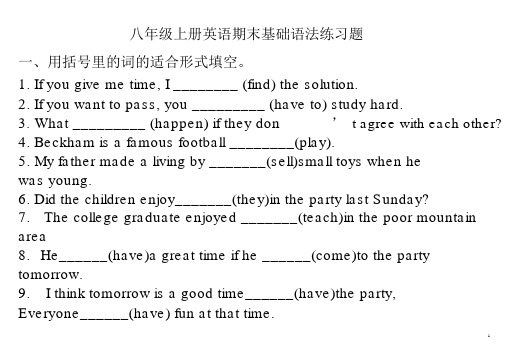
八年级上册英语期末基础语法练习题一、用括号里的词的适合形式填空。
1.If you give me time, I ________ (find) the solution.2.If you want to pass, you _________ (have to) study hard.3. What _________ (happen) if they don’ t agree with each other?4.Beckham is a famous football ________(play).5.My father made a living by _______(sell)small toys when hewas young.6.Did the children enjoy_______(they)in the party last Sunday?7.The college graduate enjoyed _______(teach)in the poor mountain area8.He______(have)a great time if he ______(come)to the party tomorrow.9.I think tomorrow is a good time______(have)the party,Everyone______(have) fun at that time.10.Half the class _______(stay)at home on the weekend now.11.I will also be able _______ (work)outside sometimes.12.What about _______(listen)to the radio?13.The______(three)shirt is the nicest of all.14.This bag is much_______(big)than that one.15.Most students spent more than one hour_______ (write)the composition.16.All of us were surprised____(see)how Americans abused the Iraqi prisoners.17.I don't know if he __(come)tomorrow, but if he __(come)tomorrow, I'll let you.18.________ (join)the Lions, and you_______(become)a great soccer player.19.In the past, Peter ______(spend )a lot of time everyday_______(play)football.20.If he_____(stay)at home, he'll be sorry.21.I am learning how_______(swim).22.Many of my friends are_____(lawyer).23.______ (watch )TV too much is bad for your eyes.24.Could you tell us the ______ (different )between these two styles of music?25.Mike goes to see his grandparents _________(one) a week.26.He spends more than an hour __________(exercise) every day.27. He didn ’got to school. He could ________(hard) read or write.28. It’ s a good habit to brush your(tooth) every day.29.To keep healthy ,I decide _______ (exercise) half an hour every day.30.Look! Your pet dog is(die).31.Exercise is(health) for the mind and the body.32. Your sweater is beautiful. I want _________(buy) one ,too.33. How about (go) shopping on Sundays?34. He usually study English by (read) it in the morning.35.We decided(go) to the beach near our hotel.36.I really enjoy(walk) around the town.37.We wanted(walk) up to the top.38.My family(go) to the beach every summer.39.Did you have a great time(talk) in groups?40.Lucy usually_ ______to school early. But today she ________to school late. (go)41.---Where did you______(study) last night?--No, I________(help)my mother_______(clean) the room.42.Do you feel like(drink) some orange?43.Our teacher often keeps us(read) English in the morning.44. It’ s very interesting _____ ( feed) the pets.45.He is ____(bad) at learning maths. He is much _____ (bad) at Chinese and he is the ____ (bad) at English.46.Annie says Sally is the ______ (kind) person in the world.47.He is one of the_________(friendly) people in the class, I think.48.A dictionary is much _________ (expensive) than a story-book.49.An orange ia a little ______ (big) than an apple, but much________ (small) than a watermelon.50.The Changjiang River is the _______ (long) river in China.51.Sue is a little ___________ (beautiful) than her sister.50. My room is not as _________ (big) as my brother' s.53. --How difficult is physics?--I' m not sure. -- Is it ________ (difficult) than math?-- I don' t think so.54.-- Annie plays the piano very ___________ (well).--Sue plays it _____ (well) than Annie. And Sally plays it the__________ (well).55.Saturday is my _________ (busy) day in a week.56.Her mother is getting ____________(fat) and ________ (fat).57.I think it' s too expensive. I' d like a _____________ (cheap) one.58.He comes to school much ____________ (early) than I.59.This book is not as _____________ (interesting) as that one.60.Your classroom is __________(wide)and ___________(bright)than ours.61.Practise as __________ (much) as you can.62.The ________ (much), the ____________ (good).63.Nowadays( 此刻 ) English is __________( important ) than any other subject, I think.64.Most of the students think a lion is much ______(dangerous) thana bear and it is the ______ (dangerous) animal in the world.65. It’ s to say than to do (easy)66.Which do you like of all the coats? (well)67.The apples in the other shop areand.(cheap; good)68. Many of the stars are so away that we can’ t see them. (far)69.The Yangtze River is very(long) . In fact, it’s riverin China (long)70.Did you decide ________________(visit) your grandparents?71.There are many _______________ (different) between them.72.I can’ t stand _________________ (hear) the bad news.73.Lucy and Lily are the ______________ (win) of the talent show.74.This shirt isn’ t as _________________(good) as that one.75.He is the _____________________ (bad) student in his class.76.The news ___________________ (be) so terrible that we all can’ t tands.77.I really enjoyed ____________________ (walk) around town.78.It is good to relax by _________________(use) internet.79.Did you have fun __________________ (play) at the party?80. Mary’s brother is as __________ (health) as her sister.81.My pen is new, but hers is ___________(new) than mine..82.It ’s necessary for us ______________ (learn) English well.83.The storybook is ____________________ (interest) of the three.84.I can ’ t stand (listen) to the noisy music.85.There (be) some exciting news in today ’ s newspaper.86.Would you mind (open) the window?87.Did you watch (sport) show on TV yesterday?88.Where do you plan (go) this Sunday?89.Do you want (watch) the news?90.Sally thinks soap operas are (educational) than sitcoms.91.I hope (watch) the action movie one day.92.Yao Ming is a (success) player in NBA.93.I think Xi Yangyang is as (famous) as Mikey Mouse.94.He is (funny) than the other students in his class.95.Did you have fu n(learn) something?96.Nelly practiced(dance) a lot more than Lisa.97.His mother often makes him(clean) his room on weekends.98.Lisa practiced a lot more and wanted(win).99.It’ s necessary for us(learn) English well.100.He is(different) from his brother. They have some (different).二. 句型变换。
unit8单元基础知识和语法知识梳理及练习2024-2025学年人教版八年级英语上册

人教版八上8单元基础知识和语法知识梳理及练习词形变化1.shake v.3.dig v.5.tradition(n.)短语梳理1.奶昔2.接通;打开3.把……倒入……4.一杯酸奶5.好主意6.在星期六7.切碎8.把……放入……9.还有一件事10.一片/张/段/首……11.一些;几个12.用……把……装满13.用……覆盖……14.一个接一个;逐个;15.很长时间16.在此时语法梳理1.how many+可数名词复数多少……2.how much+不可数名词多少……3.It’s time (for sb.)+to do sth. 到(某人)做某事的时间了4.First…Next…Then…Finally 首先……接下来……然后…….最后……5.want + to do sth.想要做某事6.forget+to do sth.忘记去做某事7.how + to do sth.如何做某事8.need+to do sth.需要做某事9.make+宾语+形容词使……怎样l10.let sb. +do sth.让某人做某事11.give thanks for +名/代V-ing “感恩…”12.by doing sth. 通过做某事.13.make+sb+do 使某人做某事巩固练习一、单项选择( ) 1.—Mike _________ the bowl __________ some water.A. full...withB. full...ofC. filled... withD. filled... of( ) 2.—What are you doing, Uncle Wang?—I am sorting out old books and I’ll to kids in West China.A. give them upB. give them awayC. give them offD. give them in ( ) 3.—The funny stories make all the children ________________ .A. laughB. laughingC. to laughD. laughed( ) 4. Welcome to my new house, Ann and John! Help to some fruit.A. myselfB. yourselfC. yourselvesD. yourselfs ( ) 5. Five months later, Mr Smith_________ a new book called Little Star.A. wroteB. will writeC. writesD. write( ) 6. exercising, and you’ll be healthier.A. KeepB. To keepC. KeepingD. Kept( ) 7. How soon will Mr Green arrive in the USA? _______________A. For a few days.B. In a few days.C. After a few days.D. A few days later. ( ) 8. I will send you an e-mail as soon as I in Canada.A. arriveB. arrivedC. am arrivingD. will arrive ( ) 9. We have a lovely room. It’s one of in the hotel.A. niceB. nicerC. nicestD. the nicest( ) 10. --- do you go to church ? --- Every Sunday.A. How oftenB. How longC. How soonD. How far( ) 11. It is true that knowledge rather than being taught.A. learnsB. learnedC. is learnedD. was learned ( ) 12.—Do you have enough students to clean the laboratory?—No, I think we need students.A. anotherB. two othersC. more twoD. two more( ) 13. Jane’s mother preferred TV at home to to the concert.A. to watch; goB. watching; goingC. watching; goD. to watch; going ( ) 14. 1 don’t like the color of the T-shirt. Would you show me one?A. otherB. the otherC. anotherD. others( ) 15. me carefully, boys and girls. Can you me?A. Listen to; hear fromB. Hear; listen toC. Hear; hearD. Listen to; hear ( ) 16. —How much _______do we need for a sandwich?—Three spoons.A. breadB. tomatoesC. onionsD. butter( ) 17. It’s going to rain. Don’t forget _______an umbrella with you.A. takeB. takesC. takingD. to take( ) 18. —_______ cups of orange juice are there on the table? —Five.A. How oftenB. How muchC. How manyD. How long( ) 19. Wash some tomatoes and then_______.A. cut up themB. cut them upC. cut up itD. cut it up( ) 20. He tried many times, and _______ passed the exam.A. firstB. finallyC. nextD. hardly( ) 21.—Let’s make orange and strawberry juice. —_______.A. Good ideaB. Never mindC. Not at allD. Thank you二、用所给词的适当形式填空1. How(many) yogurt do we need?2. Next you need(cut) up three bananas.3.(final) enjoy the Super Sandwich.4.(add) the salt to the noodles, please5.(one) peel some pears, then cut them up.6. Would you like to have some ____________ (potato) for lunch?7. I had a glass of milk and two ____________ (piece) of bread for breakfast.8. There are some yellow ____________ (plate) on the table.9. There are some ____________ (sandwich) on the table.10. The Spring Festival is a____________ (tradition) festival in China.11. He can drink three cups of ____________ (juice).12. I would like to eat a big bowl of beef____________ (noodle).18. I don’t like____________(some) sugar in the tea.19. ____________(one) peel some pears,then cut them up.20. I had a glass of milk and two ____________ (piece) of bread for breakfast.三、用所给动词的适当形式填空1. Let’s ____________ (make) fruit salad.2. I want ____________ (cut) up the watermelon.3. Could you tell me how ____________ (turn) on the machine.4. It’s a time ____________ (give) thanks for food in the autumn.5. We need ____________ (dig) a hole before we plant a tree.6. Most Americans celebrate this idea of giving thanks by__________(have) a big meal at home.7. Please ____________ (cover) the bowl with a piece of paper.8. ____________(make) this special food, you need to have rice noodles, chicken soup and so on.9. Please remember ____________ (serve) it to your parents first.10. We forgot(tell) him the news, so he didn't know at all.11. We hope(see) you soon.12.Thanks for your _____________ (invite).13.The students enjoy(have) birthday parties .四、词语填空AThanksgiving in North AmericaIn most countries, people usually eat ___1_______( tradition) food on special holidays.A special day in North America is Thanksgiving. In the United States, this festival is always ___2_ the fourth Thursday in November, but in Canada it falls on the second Monday in October. Thanksgiving is a time ___3____(give) thanks for food in the autumn and other good things people enjoy in life. Families see Thanksgiving 4_____ a time to get together and usually celebrate it with a big family meal. The main dish of this meal is almost always turkey, a large bird. To go with the turkey, people often prepare other ___5____(thing) , such as gravy, cornbread, mashed potatoes, and pumpkin or apple pie.But how ___6____(make) a turkey dinner . Here is one way to make turkey for a Thanksgiving dinner.First, mix together some bread __7______(piece),onions, salt and pepper.Next, fill the turkey ___8___ this bread mixThen, put the turkey in a hot oven and cook it for a few hours._____9_____ it is ready, place the turkey on a large plate and cover it __10___ gravy. Finally , cut the turkey into thin pieces and eat the meat with vegetables like carrots and potatoes .BHello, everyone! I am Sandy. Today we have a 1 (discuss) about how to give thanks to our parents in class. Our teacher says we can make some food for 2 (they). We all think it is a good idea.Tom 3 (plan) to make popcorn. His grandmother knows how to make popcorn. She can tell him the way 4 (make) it. Gina cooks noodles 5 (good), and we all like her noodles. Mike wants to make Russian soup. And he tells us how to make it. 6 , (one) buy some beef and vegetables. Then, cut them up. After that, 7 (put) them into a pot and add some water. For one more thing, cook them for half an hour and add some 8 (salt). I want to make fruit salad. I 9 (learn) to make it from a book. It is so easy that I can do it quickly.Our teacher says if we want to give 10 (thank) to someone, we must put our hearts into it. I will remember that in my mind.CAre you interested in fish? Is there anything 1 (enjoyable) than a piece of cooked fish? Today let me show you how to cook fish in 2 easy way.First, get a fish and a plate ready. You can choose any kind of fish you like. And remember 3 (pour) some oil on the plate.Next, season(加调料调味)the fish. Don’t worry. 4 is very easy to season the fish. You can be able to 5 (mix) salt and pepper together and add them to the fish. It’s simple, isn’t it?Then, 6 (cover) the fish with a lid(盖)and put it in the microwave(微波炉). Turn 7 the microwave and let it work for about ten minutes. 8 the fish is in the microwave, you can prepare a side dish(配菜). Some rice and a vegetable salad are good food to go with the fish.9 (final), put the side dish on the plate, next to the fish. Now it’s time 10 (eat) your delicious dish!五、句子归位_____1_____ Italians like to eat pizza. Indians like to eat hot food. Japanese like to eat fish. Often they don't cook it.In England, one of the most popular kinds of food is fish and chips. ____2______ They put it in paper bags, and take it home, or to their workplace. _____3_____ The world's favorite food is American fast food. If you go to some important cities in the world, you can find people eating hamburgers and chips.Fish and chips, and Chinese takeaway food are very popular in England. ____4______ The Americans eat takeaway food, too, like chicken. But the most popular kind of takeaway food is the ha hamburger. _____5_____ Ham(火腿)is a kind of pork, but the hamburger does not have any pork in it. Hamburgers are also popular in England and Australia.根据材料内容,从下面五个选项中选出能填入文中空缺处的最佳选项,使短文意思通顺、内容完整,并将其标号填写在下面题号后的横线上A. Sometimes they eat it in the park or on the roadB. It looks like bread with meat in itC. People usually buy it in a fish and chips shopD. Every country has its favorite food.E. But they are less popular in the USA.。
人教版英语八年级上册 Unit6-7语法重点:一般将来时_专项讲解与练习 (有答案)
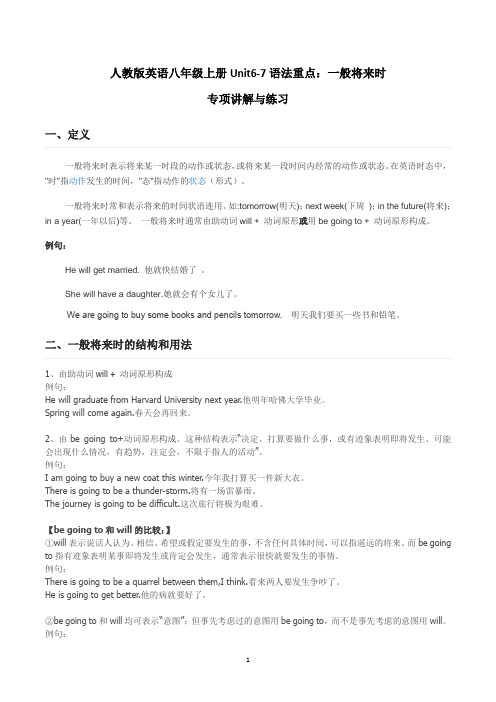
人教版英语八年级上册Unit6-7语法重点:一般将来时专项讲解与练习一般将来时表示将来某一时段的动作或状态,或将来某一段时间内经常的动作或状态。
在英语时态中,"时"指动作发生的时间,"态"指动作的状态(形式)。
一般将来时常和表示将来的时间状语连用。
如:tomorrow(明天);next week(下周);in the future(将来);in a year(一年以后)等。
一般将来时通常由助动词will + 动词原形或用be going to + 动词原形构成。
例句:He will get married. 他就快结婚了。
She will have a daughter.她就会有个女儿了。
We are going to buy some books and pencils tomorrow. 明天我们要买一些书和铅笔。
1、由助动词will + 动词原形构成例句:He will graduate from Harvard University next year.他明年哈佛大学毕业。
Spring will come again.春天会再回来。
2、由be going to+动词原形构成。
这种结构表示“决定、打算要做什么事,或有迹象表明即将发生、可能会出现什么情况,有趋势,注定会,不限于指人的活动”。
例句:I am going to buy a new coat this winter.今年我打算买一件新大衣。
There is going to be a thunder-storm.将有一场雷暴雨。
The journey is going to be difficult.这次旅行将极为艰难。
【be going to和will的比较:】①will表示说话人认为、相信、希望或假定要发生的事,不含任何具体时间,可以指遥远的将来。
而be going to指有迹象表明某事即将发生或肯定会发生,通常表示很快就要发生的事情。
- 1、下载文档前请自行甄别文档内容的完整性,平台不提供额外的编辑、内容补充、找答案等附加服务。
- 2、"仅部分预览"的文档,不可在线预览部分如存在完整性等问题,可反馈申请退款(可完整预览的文档不适用该条件!)。
- 3、如文档侵犯您的权益,请联系客服反馈,我们会尽快为您处理(人工客服工作时间:9:00-18:30)。
人教版新目标八年级上册英语语法知识点精讲+练习(一)一般将来时一般将来时表示将来某个时间要发生的动作或者存在的状态。
通常与表示将来的时间状语连用,如tomorrow, the day after tomorrow, next year, next month, next week, in 100 years等。
be going to do(动词原形)结构:表示打算、准备做的事情或者肯定要发生的事情。
如:It is going to rain.will do结构表示将来的用法:1. 表示预见Do you think it will rain? You will feel better after a good rest.2. 表示意图I will borrow a book from our school library tomorrow.What will she do tomorrow?基本构成如下:一般疑问句构成:(1)will+主语+do…? Will Sarah come to visit me next Sunday?(2)there be 结构的一般疑问句:Will there + be …?Will there be fewer trees? Yes, there will. / No, there won’t)+do否定句构成:will + not (won’tSarah won’t come to visit me next Sunday.特殊疑问句构成:特殊疑问词+will+主语+…?What will Sarah do next Sunday?根据例句,用will改写下列各句例:I don’t feel well today. (be better tomorrow)I’ll be better tomorrow.1. Gina has six classes today. (have a lot of homework tonight)_____________________________(sleep later)2. I’m tired now._____________________________3. My parents need a new car. (buy one soon)_____________________________(leave a little later)4. We can’t leave right now._____________________________5. The weather is awful today. (be better tomorrow)_____________________________答案:1. She’ll have a lot of homework tonight.2. I’ll sleep later.3. They’ll buy one soon.4. We’ll leave a little later.5. Maybe it’ll be better tomorrow.(二)should的用法:should用来提出建议和忠告,后边加动词原形,否定句直接在should后边加not.例如:I think you should eat less junk food.我认为你应该少吃垃圾食品。
She drives a lot and she seldom walks. So I think she should walk a lot.她经常开车,很少走路。
所以我认为她应该多走路。
games.Students shouldn’t spend too much time playing computer学生们不应当花太多的时间玩计算机游戏。
学习向别人提建议的几种句式:(1)I think you should…(2)Well, you could…(3)Maybe you should …(4)Why don’t you…?(5)What about doing sth.?(6)You’d better do sth.填空用should或shouldn’te night before exams.1. I can’t sleep thYou ______ take a warm shower before you go to bed.2. Good friends ______ argue each other.3. There is little milk in the glass. We _______ buy some.4. They didn’t invite you? Maybe you ______ be friendlier.5. I am a little bit overweight. So I think I _______ do exercises every day.答案:1. should 2. shouldn’t3. should 4. should 5. should(三)过去进行时过去进行时表示过去某一点时间正在进行的动作或者过去某一段时间内一直进行的动作。
1. 构成was /were + doing,例如:I was watching TV at 9 o’clock last night.是时间点at 9 o’clock last nightThey were playing football all afternoon.all afternoon是时间段2. 过去进行时的标志词等。
at 8 o’clock last night, this time yesterday例如:I was having lunch at home this time yesterday. 昨天的这个时候我正在吃午饭。
At that time she was writing a book. 那阵子她在写一本书。
(表示她在那段时间里一直在做那件事情。
)练习用括号中所给动词的适当形式填空。
1. This time yesterday I ____ ______(read)books.(have)a party.2. At 9 o’clock last Sunday they ______ ______3. When I _____(come)into the classroom, she ________ ______(read)a storybook.4. She _____ ______(play)computer games while her mother ____ ______(cook)yesterday afternoon.5. I _____ ______(have)a shower when you _______(call)me yesterday.答案:1. was reading 2. were having 3. came; was reading 4. was playing; was cooking 5. was having; called (四)间接引语形成步骤:(1)不要逗号,冒号,引号(2)要考虑到人称的变化(人称的变化与汉语是一致的)(3)要考虑时态的变化(4)要考虑时间状语、地点状语和语示代词的变化。
1. 直接引语变成间接引语时,几个主要时态的变化规律直接引语间接引语一般现在时一般过去时一般将来时过去将来时现在进行时过去进行时2. 直接引语变成间接引语时,一些词汇的变化规律直接引语1. am / is2. are3. have / has4. will5. can6. may 间接引语1. was2. were3. had4. would5. could6. might★★练一练★★用括号中所给动词的适当形式填空。
1. She said I _____(be)hard-working.2. Peter told me he _____(be)bored yesterday.3. She said she _____(go)swimming last Sunday.4. Bobby said he _____(may)call me later.5. Antonio told me he _____(read)a book then.答案:1. was 2. was 3. went 4. might 5. was reading请转述他人说的话:1. I go to the beach every Saturday. (Tom)2. I can speak three languages. (Lucy)3. I will call you tomorrow. (Mike)4. I’m having a surprise party for Lana. (she)(五)if引导的条件状语从句结构:if+一般现在时,主语+将来含义:如果……,将要……例如:If you ask him, he will help you. 如果你请求他,他会帮助你。
If need be, we’ll work all night. 如果需要,我们就干个通宵。
★★练一练★★根据中文提示,完成句子。
1. 如果你参加聚会,你将会过得很开心。
If you ________ the party, you __________.2. 如果明天下雨,我们将不去野餐。
If it __________ tomorrow, we ___________.3. 如果你经常听英文歌,你将会喜欢英语的。
If you often ________, you _________________.答案:1. If you go to the party, you will have a good time2. If it rains tomorrow, we won’t go to the picnic3. If you often listen to English songs, you’ll like English二. 完形填空特点及解题思路(一)题型分类与特点完形填空试题是在给出的一篇短文中有目的地拿掉若干个词,留下一些空格,要求考生借助短文保留的部分,从所给的短文整体出发,在正确理解短文意思的基础上,根据句子和句子间的内在联系、词的用法和习惯搭配等,用适当的词或词语填空,使补全后的短文意思通顺、前后连贯、结构完整。
这种题型测试的内容从形式上看是单词或短语的填空,但它必须注意到短文中上、下文意思连贯、词语搭配和语法结构正确,所以在空格上所填的词必须符合语义适用和语法正确两条原则,只考虑某一侧面都可能导致错误。
